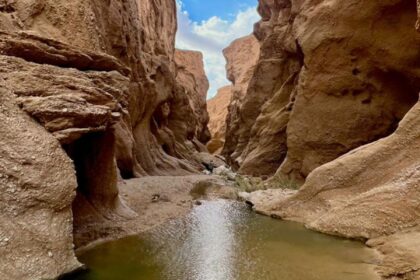\n
Chaharshanbe Suri is one of the long-standing Iranian traditions and sweet customs of the last days of the year, official in yellow, red and orange colors that have the mood of fire and the fragrance of spring. If all the information you have about this ceremony is to jump over the fire and read that famous poem Zardi and Sarhi, stay with us until the end of this article.
\n\n
A look at the history of Wednesday in Syria
\n
First of all, let’s see what is the philosophy of Charanbash Suri and where this sweet custom is rooted. The celebration of Chaharbansh-e-Suri or “Sur”, the last Wednesday of the year, is one of the authentic Iranian traditions and specific to Iranians, the oldest mention of which is found in the book “Tarikh Bukhara” in the years 286-358 AH. “Wednesday” symbolizes the days of the week and “Suri” is a form of the red word symbolizing fire, the fire that is never polluted among the four elements and has been a symbol of purity and purity since the distant past.
\n
Ancient Iranians, before the arrival of Islam, celebrated the end of every month with a celebrationThey established the name Sur. Over time, these celebrations were removed one by one from Iranian culture. But the customs and traditions of the ever-magnificent celebration of the Syrian Wednesday remained as strong as before, and it is one of the most popular ancient Iranian festivals.
\n
Customs of Syrian Wednesday
\n
The ancients considered the last Wednesday of the year as the time to welcome spring and celebrated this sweet tradition by jumping over the fire and singing the famous poem “My yellowness from you, your redness from me”. The audience of this prayer-like poem was the flames of fire and in this glorious night He wanted to cure the diseases of the previous year and bring happiness and vitality to the new year.
\n
1. start a fire
\n
\n
Lighting the fire is the most beautiful, oldest and most enduring tradition on the last Wednesday of the year. After housewarming, our ancestors used to set fire to old and useless appliances, jump over them and recite firework poetry. At the end, they would pour the ashes of burnt bushes behind the doors of the houses and knock on the door so that the owner of the house would open the door to “health”.
\n
Of course, these years, on the day after Wednesday, the traces of fireworks can be seen in all the alleys of the city.
\n
2. Reading Shahnameh
\n
Recitation of the Shahnameh is tied to most of the ancient customs of Iran, and its traces can be seen in the celebration of Chaharban Suri. The elders of the family open the fire of Shahnameh, read the poem of Chaharban Suri, some people play music and the rest of the audience stomp their feet.
\n
3. Breaking the water jug
\n
According to this old ritual, on the night of Wednesday Suri, one of the residents of the house would throw a water jar from the roof or the highest hill of the village and break it. According to the ancients, breaking the jar full of water and the delicious water that flowed on the ground would ward off all disasters and was a sign of enlightenment. In addition, he expelled the evil spirits from the house to find a lucky house.
\n
4. Divination and untying
\n
Fortune-telling is the most interesting ritual of the Syrian Wednesday in the ancient religion. On the last Wednesday of the year, young girls would stand behind the Falgush wall and listen to the pedestrians. Interpreting the speech of the passers-by was the answer to their intention.
\n
5. Spooning and asking for food
\n
\n
According to this old custom, the men and women of the neighborhood would visit the neighbor’s house with their heads and bowls in their hands and with their faces completely covered. They took nuts and sweets. This custom is called spooning, because a person hits an empty bowl with a spoon to get food. This sweet promised happiness in the new year.
\n
6. Throwing a shawl and getting mixed
\n
Shal Tanzi is one of the few sweet customs of Chaharbansuri which is still performed in many cities and villages of Iran. The youth of the neighborhood tie some colorful handkerchiefs and make a long rope that enters the house through the roof chimney. The owner of the house hears the cough of the person making the shawl, puts a Syrian gift in the corner of the shawl, ties it and sends it up, a gift that is a sign of blessing, sweetness and happiness and can be some pomegranates, sweets, bread, walnuts, hazelnuts, coins or raisins.
\n
Syrian Wednesday night foods
\n
Last year’s last year’s stock of vegetable seeds is the night supply of Chaharbansh Suri. According to the traditions of the past, pumpkin seeds, melons, watermelons, pistachios, hazelnuts and almonds are the common nightshades of this night, eating them removes hatred and envy and makes one kind. On the dinner table, they usually put smoked fish, hair leaves and Haftrang pilaf.
\n
Syrian Wednesday in different cities
\n
Every corner of Iran has different customs for the celebration of Chaharbansuri, and everyone goes to Peshwaar Bahar in the same way.
\n
1. Tehran
\n
Tehranis empty the water of Hoz Khaneh on Wednesday night. Because they have washed all their clothes and dishes in this water for the past 2 days and now they are ready to replace cleanliness by draining this water.
\n
2. Tabriz
\n
The people of Tabriz believe that on this blessed night, by sprinkling water and rose water on each other’s heads and faces, they give purity and receive purity as a gift.
\n
3. Bushehr
\n
In Bushehr, people throw fire and jump over it with joy. When the fireworks are over, they go to the river with a boat so that the flowing water of this night will wash away and take it with them.
\n
4. Shiraz
\n
The people of Shiraz take their Wednesday night to the tomb of Hafez or Saadi and wash their hands with the water of the pond to ward off evil.
\n
5. Orumieh
\n
The people of Urmia spend the night of the last Wednesday of the year in the big house of the family, laughing and joking and eating nuts. Nuts are shared by someone who has a purpose and wants it to be fulfilled.
\n
6. Ardabil
\n
In Mughan Ardabil, the ritual of Chaharbansuri is a bit more serious, from the lighting of fire and the riding of young people by the river to the dishes that are filled with river water and poured around the house when returning to symbolize the light, clarity and purity of the new year.
\n
7. Khorasan and Kerman
\n
The people of Khorasan and Kerman perform the sweet custom of breaking the jar. With the difference that instead of water, the jar is filled with salt, some charcoal, bread and a small coin. With this, bad luck will be removed from whatever is inside the jar.
\n
8. Sistan and Baluchestan
\n
The interesting custom of the people of Sistan and Baluchistan to get rid of copper on the last Wednesday of the year is that they shoot sacks, blankets and old felt and set them on fire.
\n
9. Kurdistan
\n
Kurds In addition to laying a shawl, they have an interesting custom that most of the villagers perform. They spend the Syrian Wednesday night in the heart of nature happily and stomping their feet and collect a handful of pebbles on the way back home. These stones are thrown behind the head without a second thought to ward off any calamity
\n
10. Guilan
\n
In Gilan, on the evening of Chaharbansuri, people pile up rice husks at a distance and set them on fire, jump over them in the order of the age, and sing the famous poem of Chaharbansuri. Sometimes pecans are poured into this fire to keep the evil eye away from their family.
\n
11. Masal
\n
On the day before Chaharban Suri Ivan, there is no house without food in Masal, because on Chaharban Khatun, she comes out of the well, visits the village, tastes the food on the porch, sees the house shaking and asks for good for the people.
\n
12. Lorestan
\n
Natives of Lorestan also perform the sweet tradition of fireworks. A few bundles of firewood are picked at a distance from each other, set on fire, and next to this fire, hours are spent celebrating and stomping.
\n
13. Mazandaran
\n
In Mazandaran, the people of Mazandaran spend the night of the Syrian Wednesday with a wrestling show, smoking pecans and eating delicious nettle soup or nettle soup.
\n
14. Central
\n
In addition to fireworks, the residents of Central Province have an interesting custom, and that is charity for the forgiveness of the dead. One of the residents of the house offers some dates, sugar cheese or halva to the passers-by in the street and neighborhood, and whoever picks up a seed, surely sends a fatiha for the happiness of the departed souls.
\n
Syrian Wednesday is not a war scene!
\n
\n
The dance of yellow and orange flames on the last Wednesday of the year is a symbol of purity and happiness! We are supposed to burn our sorrows and diseases and receive the gift of health. But in recent years, some people have turned the alley and street into a war scene, full of damage and terrible sounds, by misunderstanding this beautiful tradition. The violent behavior of some young people is completely contrary to the customs and character of the society and the original culture of this ancient religion, and there is no sign of hope for life, happiness and health in it. People who engage in these risky behaviors not only harm their fellows, but also distort the beautiful ritual of the last Wednesday of the year by wrongly understanding the revival of traditions and values.
\n
Common questions
\n
1. When is Wednesday in Syria?
\n
In the religion and culture of our Iranian people, the last Wednesday of the year, that is, from the evening of the last Tuesday of Esfand to after midnight of the last Wednesday of Esfand, is considered as the Syrian Wednesday. Wednesday of March 2023 or 1401 coincides with the sunset of Tuesday 23 March until midnight on Wednesday 24 March 1401.
\n
2. Which countries have a Syrian Wednesday?
\n
In addition to Iran, this celebration is held in countries such as Afghanistan, Tajikistan, Turkey and Azerbaijan.
\n
3. What should we eat for snacks on Wednesday night?
\n
Seven colored nuts included Pumpkin seeds, melons, watermelons, pistachios, hazelnuts, and almonds are the popular nightshades of Syrian Wednesday.
\n
4. What are the best Wednesday activities?
\n
One of the safest activities on the night of the Syrian Wednesday is fortune-telling, reading the Shahnameh, and flying wish balloons.
\n\n
last word
\n
Remember, keeping alive the tradition and ritual of the last Wednesday of the year is a condition for protecting this dear relic of the ancestors and passing it on to the next generations. We hope that on this glorious night, you will not sacrifice the health of the soul and body of those around you for a moment’s happiness and contribute as much as you can to the correct culture of ancient Iranian customs.
\n
Tell us about the interesting customs of your city on the last Wednesday of the year. We are waiting to hear your comments.
\n\n\n
\n\n\n
\n
\n
\n
\n
\n
\n
\t\t
\n
\n
RCO NEWS

















